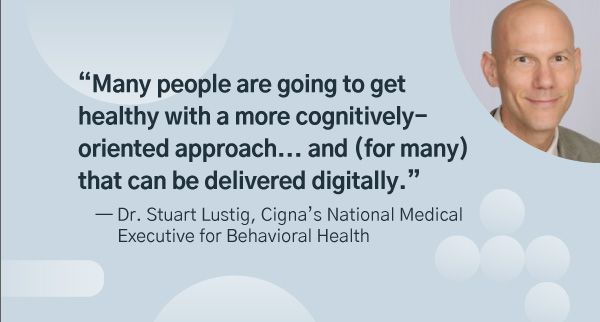
In a recent webinar, Dr. Andy Sekel, Ph.D., Twill's Chairman, discussed the status of the current behavioral health system, and asked a panel of experts what they would do to improve that system.
The video and transcript below is an excerpt from that webinar, titled “What Does 'Digital First' Mean for Behavioral Health and Can It Help Avoid The Mistakes of the Past?”
The three panelists who joined Dr. Sekel are all builders of systems that deliver healthcare to large populations of people.
Panelists included Steve Blumenfield, Head of Strategy and Innovation for Willis Towers Watson’s Health & Benefits business in North America; Dr. Stuart Lustig, Cigna’s National Medical Executive for Behavioral Health; and Michael Thompson, the President and CEO of the National Alliance of Healthcare Purchaser Coalitions.
In this excerpt from their discussion, the panelists discuss how different modalities and approaches can impact patients in very different ways.
The complete webinar is available here.
Webinar Excerpt Transcript
Steve Blumenfield: I was going to, just for a moment, Andy, pick up on what Michael said about the medications because different modalities, different treatments are going to help different people and we have to be able to be sensitive to that.
One of the things that I have seen in my work with NAMI, the National Alliance on Mental Illness— I do family to family sessions there, helping families who've been through crisis—and one of the things that we learn in those discussions and one of the things we experience for those of us who have taken, or have family members who have taken, these medications, is medications themselves are highly variable in their efficacy.
They get approved by the FDA, but they may only help a percentage of people. There may be significant side effects and then people might not stay with their treatment. The same can be said for Cognitive Behavioral Therapy or ACT or any other cognitive therapy.
The point is, Hey, if you've got a disease, maybe the first antibiotic won't work, if it’s the kind antibiotics effect. Or maybe the antiviral isn't gonna do anything for you, or perhaps the treatment you're getting isn't going to work.
But the important thing is to be able to intervene early, to measure, to have trained systems that can figure out whether there's an effect or not, and then provide different ways to provide that care.
So, Michael, I just wanted to piggyback on your thought—we shouldn't be too critical of the process because even the things we take for granted as being really effective in physical care outside of mental health have high variability.
Dr. Stuart Lustig: Yeah. That earlier question about when is a digital first approach appropriate and where there's some limitations—there are some people who essentially need what we used to call a corrective emotional experience.
They need another relationship with a human being because they didn't get enough of the good stuff growing up from their parents. That is the kind of thing where CBT is probably not going to be sufficient in and of itself.
And there's not really an app for corrective emotional experience. Which is not to say, I don't think that you couldn't get some of that necessarily digitally. You can still have a relationship with someone where much of it is mediated on the screen, but there may be some people for whom they really need to simply be sitting face to face in an office, in real time and maybe several days a week.
But by and large, many people are going to get healthy with a more cognitively-oriented approach because so much of the reason why people are ill oftentimes is because of how they're thinking about things. And changing those thoughts, of course, leads to different feelings and different behaviors and much of that can be delivered digitally in a variety of forms.
Dr. Andy Sekel: I love the example of measuring blood pressure. So one of the things that we're kind of unfolding is the system, as it's designed today, doesn't track people's progress.
They wind up at a provider, hopefully they get good care. They may or may not. And if we're really going to make a difference in the mental health system, we have to be able to measure and track.
You can watch the entire webinar here.
You May Also Like:
- An interview with Dr. Sekel: Where Mental Health Still Misses the Mark
- A letter from Twill's CMO: How to Transform Healthcare at Scale
- White Paper: How to drive 40% Digital Activation with Members


